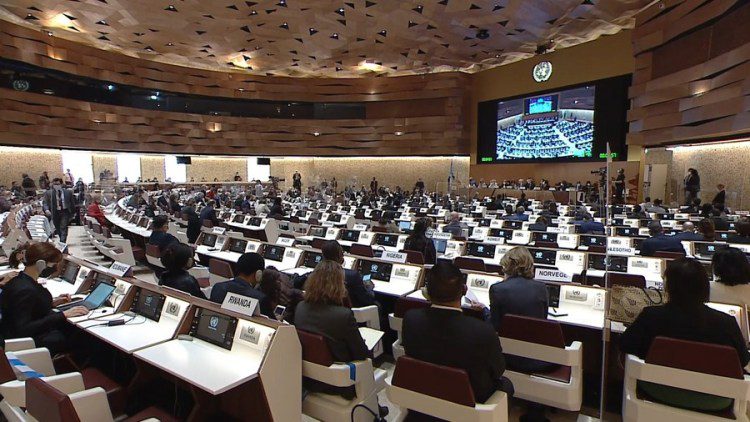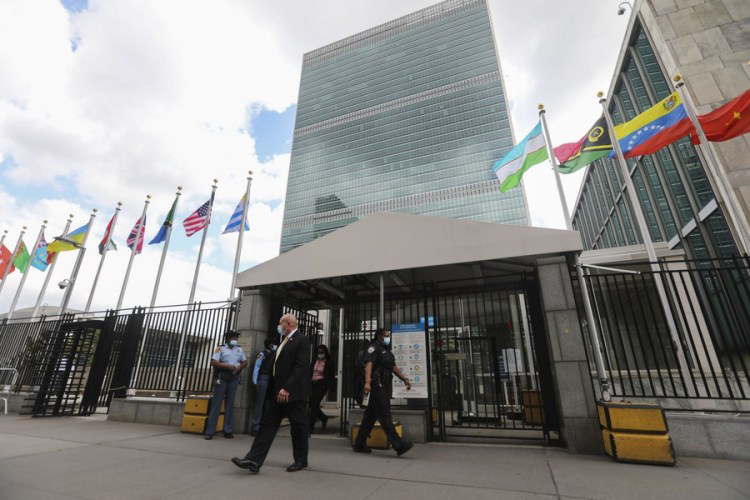
This image grabbed from a screen shows delegates attending the opening of the 49th session of the United Nations Human Rights Council (UNHRC), held at the United Nations Office at Geneva, Switzerland, February 28, 2022. /Xinhua
This image grabbed from a screen shows delegates attending the opening of the 49th session of the United Nations Human Rights Council (UNHRC), held at the United Nations Office at Geneva, Switzerland, February 28, 2022. /Xinhua
Editor's note: Hamzah Rifaat Hussain, a former visiting fellow at the Stimson Center in Washington and former assistant researcher at the Islamabad Policy Research Institute, is a TV anchor at Indus News in Pakistan. The article reflects the author's opinions and not necessarily those of CGTN.
The 52nd regular session of the United Nations Human Rights Council (UNHRC) on February 27 shows that the international community should act on major issues impacting global stability. UN Secretary General Antonio Guterres said, "human rights are not a luxury that can be left until we find a solution to the world's other problems." Accordingly, the prevention of politicization of human rights is as important as the resolution of other crises ranging from climate change challenges to the misuse of technology.
Additionally, Chinese Foreign Minister Qin Gang addressed the session, proclaiming China's advocacy for humanity, peace, development, fairness, justice and democracy across the globe. On the subject of enhancing human rights governance, China's proposal encompassed four areas that align with the universal applicability of human rights and joint commitments towards equity, justice and fairness.
China supports the path of human rights development suiting the realities of each country. For too long, human rights have been weaponized to censure countries as has been the case with the United States castigating China, although fallacies promoted on China's record on upholding human rights have been debunked. The former UN High Commissioner Michelle Bachelet's visited China in 2022. She praised China's contributions towards multilateralism and fulfilling responsibilities of the international human rights law.
The 20th National Congress of the Communist Party of China formulated a blueprint for modernization that covers human rights. The country has lifted nearly 800 million people out of poverty over the past 40 years, which accounted for 75 percent of global poverty reduction in that timeframe.

An entrance and exit of the UN headquarters in New York,September 20, 2021. /Xinhua
An entrance and exit of the UN headquarters in New York,September 20, 2021. /Xinhua
Accordingly, the "one-size-fits-all" model cannot apply to every country.
Foreign Minister Qin said there's a need to pay more attention to human rights challenges facing the developing world without unilateral coercion. If human rights are considered indivisible, then stakeholders must broaden its definition to include civil, economic, social and political rights.
China stands committed to international fairness, equity and justice. The UN Charter respects state sovereignty and preventing divisions and blocs from solidifying. Attempts to unilaterally sow division, confrontations and interfering in sovereign affairs of other states will weaken multilateral cooperation.
Additionally, dialogue and apolitical cooperation can uphold human rights. China remains open to dialogue about human rights and engaged with the UN High Commissioner to advance the global human rights governance system.
The truth is that from the Russia-Ukraine conflict to the Israel-Palestine crisis, conflicts remain unresolved while global inequality has risen to the detriment of collective prosperity.
According to the World Inequality Report of 2022, the poorest half of the global population owns close to $3,500 in purchasing power parity, as compared to the richest 10 percent who owns close to 190 times, as much. Furthermore, according to the World Bank, a "confluence of crises" in 2022 shows that the global economic slowdown has been the "steepest" since 1970, which might reverse progress on ending poverty.
Such realities can only be addressed if human rights are not weaponized by states for narrow parochial objectives, and dialogue and diplomacy takes center stage for an inclusive and economically sound world order.
The way forward is promoting the universal applicability of human rights by staying true to the spirit of the Vienna Declaration and Universal Declaration of Human Rights.
(If you want to contribute and have specific expertise, please contact us at opinions@cgtn.com. Follow @thouse_opinions on Twitter to discover the latest commentaries in the CGTN Opinion Section.)